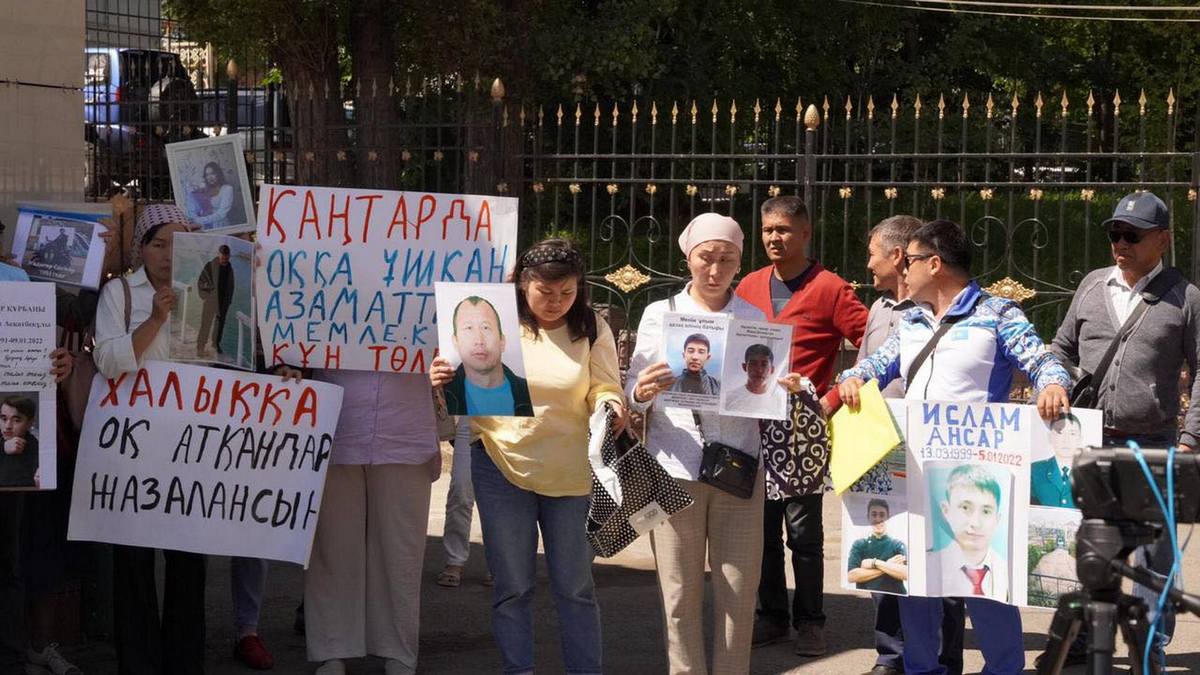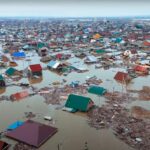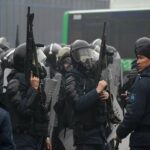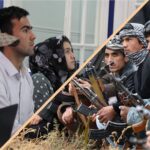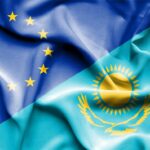Trials of participants of January protests have ended in some cities of Kazakhstan, and have not even started in other cities. They are united mainly by tortures during the investigation and unfair legal proceedings. The most high-profile proceedings are likely to take place on the quiet.
During and after the January riots in Kazakhstan that covered nearly 60 cities and settlements, around ten thousand people were detained for participation in them. Half of the detained were called to administrative account. However, no information is available about the number of suspects on 494 criminal cases initiated. Moreover, there is no information available about how many detained were released (if any were released) because of absence of the event of a crime.
Currently, there are 717 convicted of various charges – mainly for “participation in mass riots” and “looting”, but with no explanation as to the number of imprisoned ones and the number of conditional sentences. Last time the General Prosecutor’s Office provided information in mid-July, it said that out of 545 convicted ones only 83 persons went to jail. 349 suspects remained detained. 1077 persons were released from unfounded criminal prosecution.
“Rallying Kostanai” and the rest of Kazakhstan
In many respects, the case of Kostanai resident Dias Nurmagambetov and courts held in Kostanai are typical for other cities and for real and alleged participants of January events who found themselves on the wrong side of the bar.
In Kostanai located near the border with Russia, not so many people took out to the rallies in January 2022 and the riots did not lead to any significant damage. On January 5, up to one thousand people gathered in and around the square. In the evening, as in other regions, the protesters attempted to storm the regional administration, and the police responded with batons, water cannons, tear gas and stun grenades. In the morning, everything calmed down. Officially, only one police officer suffered a minor injury.
349 people were called to administrative account, and criminal charges were brought against 30 people, five of whom had previously come to the attention of the police for their opposition views. Four of them were accused of participating in the mass riots, based on the available video records, and they were also accused of the split lip of a police officer, the only victim. The young men pleaded guilty and were sentenced to three and four years of custodial restraint.
It was more difficult with the fifth defendant – 27-year-old Dias Nurmagambetov. Initially, they tried to hold him responsible for the organisation of the rally and riots in Kostanai as a person prone to civic engagement.
In early 2021, he served five days of administrative arrest for calling on citizens to hold a rally demanding to clean snow from the streets, and then was detained for a failed rally of drivers outraged by the shortage of fuel. A year earlier, Dias in a group of several dozen people was able to meet with the head of the region to discuss the problem of legalisation of cars with foreign plates. For the authorities of the provincial Kostanai these three facts turned Dias into the main troublemaker in the city.
Nurmagambetov was arrested for 15 days following the search of his apartment for participating in an unauthorised rally. While he was under arrest, police and intelligence officers visited him every day and demanded that he pleaded guilty to one of four counts of choice: attempted seizure of power, an act of terrorism, organisation of riots, and dissemination of knowingly false information. Dias preferred the last one knowing they wouldn’t let him go.
After Dias was transferred to the detention facility, he was exposed to beatings. They wanted him to confess that he was calling on the residents to gather at the square through the Telegram channel “Rallying Kostanai” by instructions of a citizen of Ukraine, or that he was following the instructions of the exiled opposition politician, ex-banker Mukhtar Ablyazov. After refusing to perjure himself, he was forced under torture to write a statement implicating several public figures and state politicians, after which Dias was released to home arrest.
Only “dissemination of knowingly false information” has reached the court out of several charges worked out by the investigation. Nurmagambetov was charged with writing the post that the Kostanai Special Rapid ResponsePolice Squad (SOBR) went over to the people’s side. The investigation also tried to convince the court that Dias was the creator and administrator of the Telegram channel. However, judge Altyn Baizhumanova was unaware of the principles of operation of Telegram channels, and even the invited expert could not help. Therefore, the defendant’s guilt was proved only by his presence in the channel chat, which he did not hide. For this, the Kostanai resident received a year of restraint.
“The trial was clearly unfair, as the judge did not figure it out whether Dias was involved in the situation, which the judge herself admitted after she delivered the verdict,” said Yelizaveta Zhuk, lawyer of the Kazakhstan International Bureau for Human Rights, who oversaw the trial. “And at the trial, the investigation only produced circumstantial evidence proving that Dias was involved. Even the invited expert could not confirm anything, and only said that it was his personal opinion that Dias shared the post that the SOBR was coming over to the people’s side.”
During the trial, Diaz Nurmagambetov claimed that he had been forced to write a confession under torture, as confirmed by medical reports. The prosecutor who was present there said that the case of torture had been closed on June 22 due to the absence of the event of a crime. During the investigation, Dias was never even questioned about the torture allegations.
“In general, the investigation was full of violations: no video records, no photos were attached, there were no witnesses, and the court should not have accepted such evidences,” Yelizaveta Zhuk said about both trials.
Torture trials remain to be seen
The statement by Dias Nurmagambetov about torture had no impact on the court. In fact, Judge Baizhumanova referred to some information from the prosecutor in this case. In other cases of torture statements, court can ignore them even despite all evidences. Moreover, after the January events, police and special services unleashed the terror against the detainees and investigated persons.
In February 2022, Deputy Chief of the Criminal Prosecution Service of the General Prosecutor’s Office Yeldos Kilymzhanov reported that the oversight bodies received 363 complaints against the actions of law enforcement agencies. The anti-corruption service is dealing with 178 criminal cases, and 8 cases were taken up by special prosecutors. On March 14, the chief of the Anti-Corruption Bureau, Olzhas Bektenov, said that eight people died as a result of torture.
The Kazakhstan Coalition of NGOs against Torture received 164 complaints of torture. But these were from the people who, as in the case of the prosecutor’s office, agreed to write complaints. Most of the victims who were tortured were afraid to file complaints against their abusers or made an arrangement in exchange for reduction of charges. The number of deaths from torture is also likely to be higher as families may have been given bodies with inappropriate medical reports; or dead bodies with clear signs of torture were found on the streets, but were pronounced dead from bullet wounds.
Only 15 persons are currently under investigation for acts of torture, 9 of whom have been placed under arrest. There’s no warranty they would all be on trial.
“In my opinion, this is a repetition of the Zhanaozen events, when 37 people claimed torture in courts, including nine or ten people who were witnesses in the cases. Nevertheless, the Prosecutor’s Office promptly replied that there was no corpus delicti when the courts ordered the Prosecutor’s Office to investigate torture, but we saw no effective and impartial investigation. And, as I see it, “new Kazakhstan” is again behaving the same. Despite the Supreme Court’s ruling that after a complaint of torture the court should be suspended and an investigation should be carried out,” said Roza Akylbekova, coordinator of the Kazakhstan Coalition of NGOs against Torture.
Now judges easily assume that the accused wants to evade responsibility by claiming torture and continue the trial. For example, it was the case of Alibek Imanbekov of Almaty, who received six years of imprisonment for weapons stealing incriminated to him.
Foreign nationals could also be subjected to torture, just like the Kazakhstanis. The case of Vikram Ruzakhunov, a jazz musician from Bishkek, who was forced to criminate himself in fear for his life, testifies to this fact.
On July 19, the Almaty court sentenced minor Saken Talipov, an ethnic Kazakh from Uzbekistan, for “participation in the mass riots” for one year conditionally, dropping all charges of violence against police officers. He said that at the detention centre, he had been beaten, hung by his hands and tortured by electric shocker not only by police officers but also by prosecutors, day after day.
Currently, according to Human Rights Commissioner in Kazakhstan Elvira Azimova, 14 citizens of Uzbekistan, two Russians and two Kyrgyz are in custody for taking part in the January protests.
Parents hope for amnesty only
It must be said that in fact “January defendants” have no chance to be acquitted both in the complete absence of evidence and guilt as such. The proportion of acquittals on criminal charges has recently risen from 0.5 per cent to 1.4 per cent (according to the Supreme Court).
It is clear that under such conditions, and even more so, being a defendant on charges related to politics, one can only hope for a milder punishment. This is possible only if there is a guilty plea and a plea bargain without complaints of torture. So, the high rate of probation might have something to do with that. But there are also many people who, even if convicted, are unlikely to be released, albeit conditionally.
Gulnar Kozhaeva, representing the initiative of parents whose children were under investigation or convicted of the January events, said that in such cases, there was only one hope for amnesty.
“However, we don’t know whether there are any preconditions, presidential decrees, by-laws, which we could use to demand amnesty and release of our children,” she said.
Her son Azamat, according to her, rendered assistance in delivering food to those in need and to hospital security guards in January after the appeal of Kairat Kudaibergenov, deputy of the City Council. Now the deputy is also arrested on the suspicion of organising riots, as well as Azamat, who had attempted to commit a suicide in the detention facility because of torture.
Gulnar, like other parents and relatives of arrested and convicted prisoners, takes part in protests in Almaty and Nur-Sultan, with participation of 20-30 people maximum, hoping to draw attention to violations during investigations, unfair sentences and torture. Sometimes the authorities “pay attention” and detain those demanding justice. Kozhaeva was also detained on August 5 right after the press conference in Almaty, where she expressed her intention to organise the march of mothers in the capital.
Key trials to come, no audience
While there is some hope for show punishment for torture, the facts of killings of protesters and innocent civilians, including children, were not investigated at all. During the tragic days, 211 civilians were killed, including seven children and adolescents and 19 security officers. Most witnesses indicated that police and military personnel were behind the killings of civilians. In this case, it is unlikely that any of the perpetrators will be put to trial.
In the meantime, all the ongoing trials in Kazakhstan against the participants of the January protests affect the protesters, rioters or opposition activists, whom the authorities have taken vengeance on with the use of legal proceedings. The latter simply had to be at the rally to be charged with participating in the riots.
But the real organisers of the riots or those declared so have not yet been presented to the society.
However, the Minister of Defence (for inaction during the January riots) and at least a dozen senior police officers and officers of the National Security Committee are now detained, starting with ex-chair of the Special Service Karim Massimov (suspected of treason), and nephew of the ex-president Nazarbayev, Kairat Satybaldy, who held high posts in the National Security Committee for many years (officially for financial fraud). Moreover, the crime boss linked with the authorities, Arman Dzhumageldiev, nicknamed Wild Arman, who turned out to be in Almaty in the centre of events together with his fighters, is also in the KNB detention facility. However, there are strong reasons to expect that these trials will be held in a closed regime.
“How can one speak of a fair trial when all the evidence was obtained through torture. All those who were caught up in the January riots were almost all beaten, crippled, with a broken mind. Until they investigate all those involved in torture, punish them, it is no use of talking about any fair decision of courts,” said Ulan Shamshet, a freelance journalist based in Almaty, who is a witness to the events of January. “The authorities themselves have arranged it, and now the same old system is judging. They just want to find the scapegoats now.”
SOURCE:
Cabar.asia


